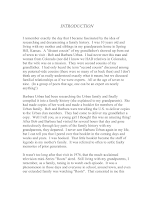Today I attended a webinar hosted by the St. Louis Genealogical Society (I am so glad I joined the society they offer awesome programming!) on AI and Genealogy by speaker, Jim Ross. What a fabulous decision to attend this webinar. While Jim gave a well-organized introduction to AI and then explained various types of AI tools the best part was him demonstrating WHAT it could do. I started playing with ChatGPT while watching the webinar and took an ancestor, Dietrich Otto Roepe, as my subject to play with AI and how it could help me. Without further ado, I present Dietrich Otto Roepe my great-great grandfather.
The Journey and Legacy of Dietrich Otto Roepe
From Hanover to America
In the quiet village of Rodewald, nestled in the Kingdom of Hanover (now Germany), a boy named Dietrich Otto Roepe was born on April 7, 1837. He was the son of Johann Friedrich Wilhelm Conrade Roepe and Maria Elisabeth Haffner, who raised him with deep-rooted values of faith, resilience, and hard work. These qualities would serve him well as he embarked on a journey that would take him across the ocean to an unknown world.
At just 14 years old, Dietrich and his family left everything they had ever known, boarding the SS Johann Schmidt in Bremen. Their destination: the United States of America. The ship arrived in New Orleans on November 10, 1851, marking the beginning of a new chapter in their lives.
The family then traveled north to St. Louis, Missouri, a growing city full of promise—but also chaos. Shortly after their arrival, St. Louis erupted in a violent election riot, an event that would prove devastating for the Roepe family. In the unrest, many of their personal records, including Dietrich’s birth and church documents, were lost. Though this event wiped away much of their official history, it could not erase their determination to build a better future.
The Civil War Years
By 1860, Dietrich had settled in Freedom Township, Lafayette County, Missouri, where he lived with his older brother’s family and worked as a miller. But soon, the United States would be plunged into a conflict that would change the course of his life once again.
When the Civil War broke out, Dietrich answered the call to defend his new homeland. He first joined the Missouri Home Guards, a local militia that sought to protect communities from the ravages of war. Later, he served in the Seventh State Militia Cavalry, witnessing the brutal realities of battle from 1862-1865. Through these difficult years, he displayed the same resilience that had carried him across the ocean as a boy.
A Family and a Future
With the war behind him, Dietrich was ready to settle down. On October 25, 1866, he married Georgianna Rosina Frerking in Lafayette County, Missouri. Together, they built a home and raised a large and loving family. Their children—Martha Emilie, Charles Otto, Otto Edward, Emilie Rosine, Amalia Regina, Edward Richard, Julius Johann Wilhelm, Paul Dietrich, Amanda Dorothea, and Anna Louise—grew up in the warmth of a hardworking household.
Dietrich worked tirelessly to provide for them. The 1870 census recorded him as a farmer in Freedom Township, and by 1880, he had transitioned to working as a teamster in Concordia, Missouri. His life was one of constant movement, always adapting to the needs of his growing family.
Later Years and Legacy
When Georgianna passed away in 1895, it marked the end of a long and devoted marriage. Seeking companionship once again, Dietrich remarried Dorine Freund on May 14, 1901, in Sweet Springs, Saline County, Missouri. Though time had begun to slow him down, he remained active. The 1900 census listed him as both a landlord and a farmer, showing that his work ethic never faded. By 1910, he was living with his daughter Martha and her husband, Fritz Kueck, in Concordia.
A remarkable photograph of Dietrich in his later years captures the essence of who he was—a strong, proud patriarch, standing with an air of quiet wisdom. His neatly trimmed beard and thoughtful gaze reflect the weight of a life well-lived, one that had seen war, hardship, love, and the fulfillment of the American dream.
Dietrich Otto Roepe passed away on July 25, 1919, in Thayer County, Nebraska. His gravestone, set in Saint Peter Lutheran Cemetery in Deshler, Nebraska, stands as a monument to his journey.
The German inscription on the stone reads:
"Selig sind die Toten, die in dem Herrn sterben."
("Blessed are the dead who die in the Lord.")
His story is more than just history—it is a legacy. From a young immigrant boy crossing the Atlantic to a soldier, farmer, husband, and father, Dietrich Otto Roepe’s life is a testament to resilience, faith, and perseverance.
Today, his descendants walk in his footsteps, shaped by the sacrifices he made so many years ago. His story reminds us that we are not just individuals—we are the continuation of a remarkable journey that began with those who came before us.










